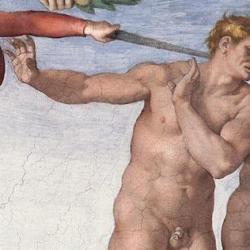INTRODUCTION
“You are not greater than our father Jacob, are you?” asked the Samaritan woman at the well of Sychar to the stranger who offered her living water. By His death and resurrection, Jesus answers that question: He is the true Israel, greater than Jacob.
THE TEXT
“Then Jacob went on his journey, and came to the land of the sons of the east. He looked, and saw a well in the field, and behold, three flocks of sheep were lying there beside it, for from that well they watered the flocks. Now the stone on the mouth of the well was large . . . .” (Genesis 29:1-12).
OPENING WELLS
Jacob has tricked his brother Esau out of his birthright and out of his blessing. Esau wants to kill Jacob, so Jacob flees to the east, to the home of his mother’s brother, Laban (cf. Genesis 24:29; 28:2). When he arrives, he finds a well in the field, meets Rachel, and waters her flocks.
Wells are mentioned frequently in Genesis. Twice Hagar finds a well in the wilderness (16:14; 21:19). Philistines seize Abraham’s well (21:22-34), and Abraham’s chief servant finds a wife for Isaac at a well (24:10-27). Later, Philistines fill in the wells of Isaac, forcing him to move on (26:18-33). Oases grow up around wells, and when we add animals, a man, and a woman, we have an Edenic setting. The Patriarchs are new Adams, traveling an arid land bringing water from the rocky soil.
When he arrives in Paddan-Aram (28:2, 5), Jacob opens a well closed up with a “large stone” (29:2). With the water from the well, he waters the flock of Laban (29:10), and greets Rachel with a kiss. At the well, the first Israel opens water for flocks and greets a future bride. He opens the well among the “sons of the east” (29:1), those who are distant from the presence of God.
WATER AND SPIRIT
John’s gospel returns again and again to the image of water. John the Baptist baptizes in water but is the forerunner of a greater prophet who will baptize with the Spirit (1:29-34). In His first sign, Jesus transforms the water of Jewish purification into the wine of a wedding celebration (2:1-11), and later tells Nicodemus that one must be born of “water and Spirit” to enter the kingdom (3:5). Jesus promises living water to the Samaritan woman at the well, a type of the new bride of the Last Adam (4:9-15), and later John informs us that the water Jesus offers is the Spirit Himself (7:37-39). When Jesus dies, a soldier pierces His side, and as water and blood flow from Him, He becomes the Rock of the wilderness and the temple of Ezekiel (19:34-35; cf. Exodus 17:1-7; Ezekiel 47; 1 Corinthians 10:1-4). He promises that everyone who believes in Him will have flow with “rivers of living water” (John 7:38), but Jesus is the first. He becomes the well from which flow waters of cleansing, waters that transform the waste of the world into a garden.
It is supremely in His resurrection that Jesus is the greater Jacob. At His resurrection, the “large stone” is rolled away (Matthew 27:60; Mark 16:4). Under the law, tombs are intensely defiling (Numbers 19), but Jesus’ tomb becomes a spring, flowing with life not death. Jesus comes out to greet the new bride, Mary, in a garden (John 20:11-18) and to breathe the Spirit, pouring living water, on His disciples (John 20:22-23), the shepherds of His new flock.















